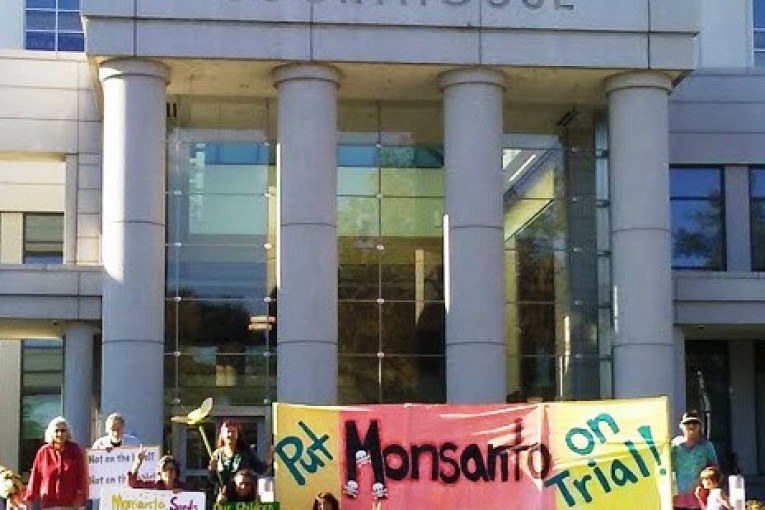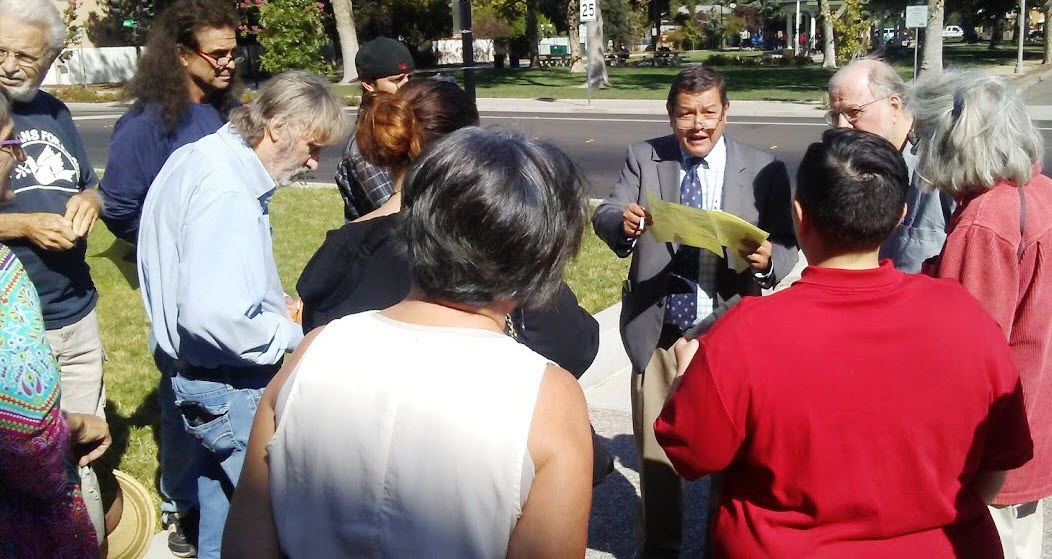

Despite Attempts to Downplay Activists’ Plan to ‘Put Monsanto on Trial’; Yolo County Judge & Defendants Trade Courtroom Barbs
By Crescenzo Vellucci
After some spicy courtroom give and take between judge and defendants, the so-called “Monsanto 10” trial – thought to be torpedoed when the Yolo County District Attorney’s office eliminated the chance for jury trial by charging a traffic court infraction rather than the original multiple misdemeanors – is now set for a bench trial December 4.
The “Monsanto 10,” environmental and social justice activists arrested and jailed last May 22 at a protest at Monsanto’s huge plant here – said to be the largest in the world of its kind – proved to be contentious inside the Yolo County Superior Court Monday.
Defendants, visibly upset when they learned at their first hearing in August that they couldn’t “put Monsanto on trial” before a jury, continued their courtroom outbursts over what they consider collusion between Monsanto and the DA, and maybe the judge, to avoid a more public jury trial.
“The Yolo County Court is doing Monsanto’s bidding, robbing us of a constitutionally guaranteed trial before a jury of our peers. We want the opportunity to show the jurors, and the world, how  Monsanto should be on trial for violating the planet and killing people,” said Sacramento defendant Bob Saunders. The defendants hail from as far away as New York, as well as Grass Valley, Sacramento and other parts of Northern California.
Monsanto should be on trial for violating the planet and killing people,” said Sacramento defendant Bob Saunders. The defendants hail from as far away as New York, as well as Grass Valley, Sacramento and other parts of Northern California.
Nine defendants were in court Monday, and they are all representing themselves. They were denied court appointed counsel, as required by law by a misdemeanor or felony, when the DA only charged this as an infraction – another tactic, said protestors, to deny them their rights.
Rich Dudek, an area attorney working pro bono, was recruited by the National Lawyers Guild, Sacramento Chapter to represent Elliott Adams, a out-of-state defendant. Dudek said he has serious questions about constitutionality of the charged infraction (loitering, Section 5-5.01 of the Yolo County Code) and said he is researching its application in a 1st amendment setting.
But the interaction between Yolo Judge Arvid Johnson and some of the defendants was worth the proverbial price of admission.
“You’re in bed with Monsanto,” yelled one defendant from the audience toward Johnson, who responded “I don’t know anything about this case…I’m just the judge.”
Later, when another defendant learned she had to go to the DA’s office for discovery, she asked the judge for his pen to write the information down. Again, Johnson kept it light, noting “This is my pen. Get your own.”
For its part, the deputy district attorneys present also feigned little knowledge of the case, only saying that defendants had to contact their office for more information. They seemed to want no part of the trial, or any of the defendants.
The Woodland demonstration last May were part of more than 400 “Anti-Monsanto/Anti-GMO” demonstrations worldwide in 47 states and 52 countries on six continents. Activists’ battle cry was that world regulatory organizations have declared Monsanto’s glyphosate-containing Roundup herbicide is a “serious threat to health. ”
The World Health Organization, activists said, called Roundup a ‘probable carcinogen’ in the food supply. WHO said Glyphosate has been detected in groundwater supplies and 60-100 percent of rainwater collection samples in various parts of the world.
The Woodland Monsanto plant is known to be the world’s largest Biotech seed facility in the world, activists said. Monsanto controls 92 percent of the world’s seed market and conducts genetic engineering (GE) which produces genetically modified foods (GMOs) which reportedly have been tied to health and safety issues, say activists.
Activists also said that GMOs are partially banned in many countries, including Germany, Green, Ireland, Japan, Russia, adding that more than 60 countries require GMO labeling – but not the U.S. although some surveys say more than 95 percent of Americans would approve GMO labeling.
According to a fact sheet provided by the Woodland “Monsanto 10,” Glyphosate is the most widely used pesticide in California and in the U.S. –” more than 280 million pounds were used in U.S. agriculture, primarily due to the widespread adoption of genetically engineered crops, and in 2013, 10 million pounds was used in California alone, with half of that usage being sprayed in eight of the state’s poorest counties on farm fields, lawns, gardens, school grounds, and parks, with five of those poorest counties being in the south Central Valley.”
